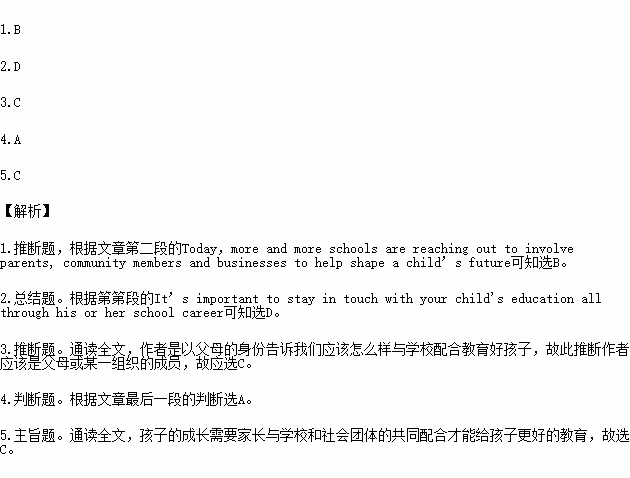题目内容
It is widely acknowledged that it is by no means an easy task to bring up a child well.And our ancestors already understood it well.“It takes an entire village to raise a child.”That’s an old proverb that is being quoted more and more often these days.And I’m pleased about that.
Today,more and more schools are reaching out to involve parents, community members and businesses to help shape a child’s future.
Parents need to be involved in their children’s education in many ways.Helping children with homework and studying,going on a field trip,teaching a craft(手工艺)or coaching a child's sports team are all great ways to be involved with your child's education.And don’t forget to communicate with teachers — they need and respect your input.Studies show that children learn more and schools function better when parents and schools work together.It’s important to stay in touch with your child's education all through his or her school career.
Communities can help children create and achieve new goals.Help with homework, read to a child,coach a children's team,or provide emotional support.Help solve problems and build self-esteem(自尊).Kids need role models and advisers can be role models by sharing their experiences and wisdom.
Businesses can also help shape our children’s future.invite a class from your local school to visit your workplace.You may be providing a glimpse that opens a new world of possibilities.Show students what goes on during a typical day.Give a mini course for students:how to use a computer;how products are made;how machinery works.You may have a developing electrician,teacher,nurse,or even a newspaper reporter on your hands.
It really does take an entire village to raise a child.So share the responsibility— and the joy— of bringing a child to his or her full potential.
1.The implied advice in the proverb“It takes an entire village to raise a child.” is that ____________.
A. All the people in a village should give food to a child
B. More than one party is responsible for a child’s future
C. Children should be brought up in the village where they were born
D. Schools should be set up in the village where a child was raised
2.According to the text,_____________ should talk with teachers to keep in touch with children’s growth?
A. community members
B. businesses
C. organizations
D. parents
3.The text was written mainly for ______________.
A. newspaper reporters and developing electricians
B. school teachers and students
C. parents and members in organizations
D. education experts and government officials
4.Students can get developed in practical working s kill through ___________.
A. business training
B community activities
C. parental involvement
D. school teaching
5.Which of the following can be the main idea of idea text?
A. Parents play an important part in children’s education.
B. Communities have no effect on the way to new and high ideals.
C. Parents and other organizations should all be responsible for children’s growth
D. Businesses may arrange softie training courses for students.
 阅读快车系列答案
阅读快车系列答案
